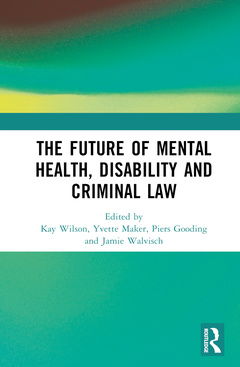The Future of Mental Health, Disability and Criminal Law
Coordonnateurs : Wilson Kay, Maker Yvette, Gooding Piers, Walvisch Jamie

This book brings together contributions from twenty-three world-leading scholars and commentators that address a range of contemporary and pressing international themes in mental health, disability and criminal law. The authors use the work of internationally renowned academic, Emeritus Professor Bernadette McSherry, as a springboard to reflect on recent developments in these areas of law and to anticipate the future directions they may take. In doing so, they aim to inform and inspire a new generation of mental health, disability and criminal law scholars, advocates and reformers.
The book is divided into four substantive sections: reforming mental health and disability law; regulating coercion and restrictive practices; improving access to justice and the criminal law; and transforming mental health law. It also includes an introduction from the editors and an afterword from Emeritus Professor McSherry.
The book is aimed at regulators, policymakers, lawyers, clinicians, consumer advocates and academics who are interested in the urgent and contentious issues surrounding the reform and development of mental health, disability and criminal law. It will help them understand the key issues and problems and presents suggestions for reform. The book is interdisciplinary and international in its focus.
Foreword; Preface; Part I: Reforming Mental Health and Disability Law; 1. What is the Future of Mental Health, Disability and Criminal Law? 2. Making the Future Happen: Law Reform Lessons from the Victorian Royal Commission; 3. The Human Right to Health and the Mental Health and Wellbeing Act 2022 (Vic); 4. Benefitting from Hindsight: What the Mental Capacity Act and Its Implementation Can Teach Us About CRPD Implementation; Part II: Regulating Coercion and Restrictive Practices; 5. Who Approves the Use of Restrictive Practices in Australia? The Case for a Uniform Authorisation Process; 6. Chemical Restraint Use and Reform in Health Care and Disability Settings; 7. Who Do We Turn To? Safeguarding Residents in Aged Care Settings from Abuse and Neglect in New Zealand; 8. Some Concerns About Arbitrary Detention of Elderly People in Secure Rest Home Care; Part III: Improving Access to Justice and the Criminal Law; 9. Whydunnit?: Causal Explanations in Sentencing Offenders With Mental Health Problems; 10. Finetuning a Jurisprudence of Risk; 11. The Rights of Persons with Sensory Disabilities to Participate in Juries; Part IV: Transforming Mental Health Law; 12. Challenging the Foundations of Mental Health Law: Using Articles 12 and 14 CRPD as a Framework to Deconstruct and Reimagine Mental Health Law; 13. The Digital Turn in Mental Health and Disability Law: Actuarial Traditions and AI Futures of Risk Assessment From a Human Rights Perspective; 14. Regulating Rights: Developing a Human Rights and Mental Health Regulatory Framework; 15. Standing Up Against the Weight of History: The Importance of Lived Experience in the Mental Health Context; Afterword
Kay Wilson is a Melbourne Post-Doctoral Research Fellow at Melbourne Law School and Melbourne Social Equity Institute.
Yvette Maker is a Senior Lecturer at the University of Tasmania, Australia and an Honorary Senior Fellow at Melbourne Law School, the University of Melbourne.
Piers Gooding is a Research Fellow at the University of Melbourne Law School and an Associate of the Melbourne Social Equity Institute.
Jamie Walvisch is a Senior Lecturer at the Melbourne Law School.
Date de parution : 09-2023
15.6x23.4 cm
Disponible chez l'éditeur (délai d'approvisionnement : 14 jours).
Prix indicatif 172,36 €
Ajouter au panierThèmes de The Future of Mental Health, Disability and Criminal Law :
Mots-clés :
Mental Health Law; Disability; Criminal Law; Law Reform; Coercion; Restrictive Practices; Seclusion and Restraint; Technology; Courts; Risk and Risk Assessment; Sentencing; Future; Bernadette McSherry; CRPD; Mental Health Laws; Victorian Royal Commission; CRPD Committee; Mental Health; Lived Experience Perspectives; Aged Care Settings; Aged Care Quality; Aged Care; Chemical Restraint; Human Rights; Substitute Decision Maker; National Disability Insurance Scheme Act; Behaviour Support Plan; Disability Service Sector; CRPD’s Article; Acquired Brain Injury; Mental Health Systems; Algorithmic Technologies; Residential Aged Care; Preventive Detention; Residential Aged Care Setting; Mental Health Legislation; Mental Health Disability



